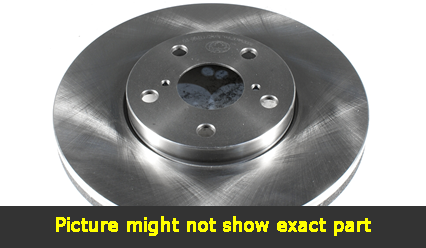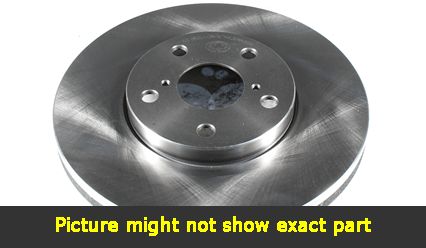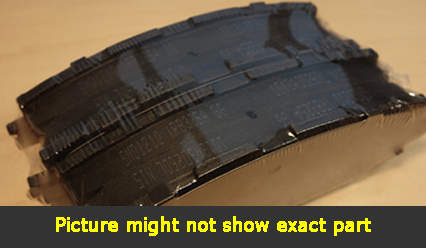2003 Ford F-550 Super Duty Brake Rotors and Pads
Click here to search another vehicle
All Rotors:
OEM x
Coated x
Drilled, Slotted and Coated x
Front x
Rear x
All Pads:
Ceramic x
Semi-metallic x
Front x
Rear x
Found 3 record

Part No: BR54064
Raybestos: 66761/60605
OE: F81Z2C026AA
Raybestos: 66761/60605
OE: F81Z2C026AA
$114.34 each
Per Car QTY: 2

Part No: BR54077
Raybestos: 66924
OE: 1C3Z1V125CA
Raybestos: 66924
OE: 1C3Z1V125CA
$83.47 each
Per Car QTY: 2

Part No: SMD777
Raybestos:
OE:
Raybestos:
OE:
$38.38 each
Per Car QTY: 1
When it comes to heavy-duty trucks like the 2003 Ford F-550 Super Duty, having reliable and efficient brakes is of utmost importance. These trucks are designed to handle heavy loads and towing tasks, and having a well-maintained braking system is crucial for the safety of both the driver and its occupants.
The braking system in the 2003 Ford F-550 Super Duty consists of several components working together to provide optimal stopping power. Let's dive deeper into these components and understand their significance.
1. Brake Pads: The brake pads are a vital part of the braking system as they create friction against the brake rotors, helping to slow down and stop the vehicle. Over time, brake pads wear down due to the constant pressure and friction. It is crucial to regularly inspect and replace these pads to ensure optimal braking performance.
2. Brake Rotors: The brake rotors, or discs, are the flat, metal surfaces that the brake pads clamp down on to slow down the vehicle. Brake rotors can also wear down due to constant use and friction, leading to decreased performance. Regular maintenance includes inspecting the rotors for any signs of warping or uneven wear and considering resurfacing or replacement, if necessary.
3. Brake Calipers: The brake calipers are responsible for applying pressure to the brake pads, which enables them to clamp down on the rotors. Over time, calipers can become worn or corroded, leading to reduced braking performance or even brake failure. Regular inspection and maintenance are essential to ensure proper functioning of the calipers.
4. Brake Lines: Brake lines are responsible for carrying the brake fluid from the master cylinder to the calipers, allowing the necessary pressure to be applied. Due to exposure to external elements, brake lines can become corroded or damaged, leading to potential leaks. Regular inspection and maintenance of brake lines are necessary to prevent any loss of braking power.
5. Brake Master Cylinder: The brake master cylinder is the heart of the braking system, as it converts the mechanical force applied to the brake pedal into hydraulic pressure that activates the brakes. A malfunctioning or worn-out master cylinder can lead to a loss of brake pressure, compromising the safety of the vehicle. Regular inspections are necessary to ensure the master cylinder is in proper working order.
It is important to note that maintaining the braking system of the 2003 Ford F-550 Super Duty requires a combination of regular inspections, routine maintenance, and prompt repairs or replacements when needed. Regularly checking the brake fluid level, ensuring proper tire inflation, and addressing any signs of braking issues such as squeaking or grinding noises are key to ensuring the optimal performance and safety of the vehicle.
Lastly, it is always advisable to consult a professional technician or service center with expertise in heavy-duty trucks, like the 2003 Ford F-550 Super Duty, for any brake-related concerns. They can provide specific recommendations and services based on the vehicle's individual needs, ensuring a reliable and well-functioning braking system. Remember, the safety of yourself, your passengers, and other road users should always be the top priority.
The braking system in the 2003 Ford F-550 Super Duty consists of several components working together to provide optimal stopping power. Let's dive deeper into these components and understand their significance.
1. Brake Pads: The brake pads are a vital part of the braking system as they create friction against the brake rotors, helping to slow down and stop the vehicle. Over time, brake pads wear down due to the constant pressure and friction. It is crucial to regularly inspect and replace these pads to ensure optimal braking performance.
2. Brake Rotors: The brake rotors, or discs, are the flat, metal surfaces that the brake pads clamp down on to slow down the vehicle. Brake rotors can also wear down due to constant use and friction, leading to decreased performance. Regular maintenance includes inspecting the rotors for any signs of warping or uneven wear and considering resurfacing or replacement, if necessary.
3. Brake Calipers: The brake calipers are responsible for applying pressure to the brake pads, which enables them to clamp down on the rotors. Over time, calipers can become worn or corroded, leading to reduced braking performance or even brake failure. Regular inspection and maintenance are essential to ensure proper functioning of the calipers.
4. Brake Lines: Brake lines are responsible for carrying the brake fluid from the master cylinder to the calipers, allowing the necessary pressure to be applied. Due to exposure to external elements, brake lines can become corroded or damaged, leading to potential leaks. Regular inspection and maintenance of brake lines are necessary to prevent any loss of braking power.
5. Brake Master Cylinder: The brake master cylinder is the heart of the braking system, as it converts the mechanical force applied to the brake pedal into hydraulic pressure that activates the brakes. A malfunctioning or worn-out master cylinder can lead to a loss of brake pressure, compromising the safety of the vehicle. Regular inspections are necessary to ensure the master cylinder is in proper working order.
It is important to note that maintaining the braking system of the 2003 Ford F-550 Super Duty requires a combination of regular inspections, routine maintenance, and prompt repairs or replacements when needed. Regularly checking the brake fluid level, ensuring proper tire inflation, and addressing any signs of braking issues such as squeaking or grinding noises are key to ensuring the optimal performance and safety of the vehicle.
Lastly, it is always advisable to consult a professional technician or service center with expertise in heavy-duty trucks, like the 2003 Ford F-550 Super Duty, for any brake-related concerns. They can provide specific recommendations and services based on the vehicle's individual needs, ensuring a reliable and well-functioning braking system. Remember, the safety of yourself, your passengers, and other road users should always be the top priority.


